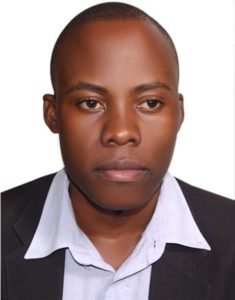 Lwanga Herbert
Lwanga Herbert
Hometown: Kampala, Uganda
University: Kyambogo University and Makerere University
Degree: B.A. in Electrical and Electronics Engineering and Computer Science
Job: Self-employed
Personal Hobbies: Reading, traveling, making new friends/connecting to new networks, problem solving, and youth mentorship
Interests: Innovation, creativity, entrepreneurship, and technology
Q: Why did you decide to go into an engineering/STEM-related field?
A: Since childhood, I have always nursed the interest to solve real-life challenges within my
community through using innovative, technology-led concepts, principals, practices, and tools. Consequently, I undertook special interest in STEM-related fields, which led me to join Electronics Engineering.
Q: Who is your role model and why?
A: My role model is Neil Armstrong. I emulate and am greatly inspired by his commitment and determination to know about the universe and its planets by starting from simple stages and moving on to complex ones in a steadfast manner that eventually lead him to be the first to reach and step on the moon. I am equally determined to push technology to impact lives on the African continent and the world at large.
Q: Which EPICS projects have you been involved in? What role(s) did you play in each?
A: “Developing, Producing and Deploying Lightening Arrestors to Curb Lightning” – a project aimed at reducing the rate of lightning-based deaths and injuries among Ugandans by using the skills of engineering students.
“Kyambogo University and Agha Khan Poverty Reduction and Environmental Conservation through Solar Powered Solutions” – a project aimed at developing an alternative energy-based solution to boost the consumption of solar power as an alternative power source to Uganda’s established national hydro-power grid. The participants learned how to design and construct solar-charger controllers; developed specifications for solar-charger controller production; drew simple engineering diagrams to illustrate their proposal pertaining to solar-charger design; and compared different power sources based on their reliability, duration, and environmental impact.
“Setting up a Functional Computer Lab to Tap the Virgin Engineering Talents of Disadvantaged Young Learners at Karinabiri Primary School and the Community/Uganda.” –a project engaging both high school and middle school level students. High school students were involved in the designing, planning, and branding of the computer lab, while the middle school students were introduced to basic technology and computing concepts.
Q: What is the most important lesson you’ve learned through your participation in EPICS community service projects?
A: Among the lessons learned from these projects are:
- The knowledge and skills of university students, if well-supported and sustained, have good opportunities for developing and applying suitable solutions to the community.
- Most community members are quite willing to participate in innovative technology projects from which they benefit considerably.
- Early and timely exposure of young learners to innovative technology application has a huge potential to convert them into future engineers and technologists well-positioned to transform their communities.
- Any innovative technology solution has a huge potential to promote community-wide development, if given sustainable support.
Q: How has the EPICS program benefitted you overall?
A: I have been able to learn how to link-up and interact with communities successfully and how to interest communities to appreciate, adopt, and utilize innovative communities for their optimal benefit. I have also been able to widen my skills base in technology, management, and human relations.
Q: What advice do you have for other students considering a career in engineering?
A: Acknowledge and appreciate their engineering potentials, abilities, and talents. Also, bear in mind that engineering and technology are the drivers of livelihoods in the 21st Century and beyond, thereby holding big opportunities for the engineering expertise that they stand to benefit from. They should subject their learning and working processes to systematic humanitarian approaches and have dreams of becoming technology entrepreneurs to create jobs and related development opportunities, as opposed to being job-seeking engineers who earn salaries and enjoy posh lifestyles while their skills do not have considerable impact in their communities.
Q: What are your future career plans and how do you think IEEE will help you get there?
A: I hope to develop and deploy more innovative engineering and technology projects that lead to community-wide development and livelihood transformation. The support needed from IEEE is to use its programs and projects to support me in sustaining these solutions. Alternatively, I request IEEE for linkage to other partners to provide me with support for the sustainability of my innovative work.

Recent Comments